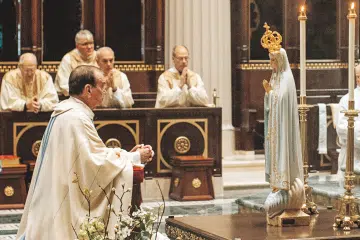Diocese looks to open temporary shelter for migrants in county facility

IMAGE: CNS photo/Michael Brown, Catholic Outlook
By Michael Brown
TUCSON, Ariz. (CNS) — Catholic Community Services in the Tucson Diocese has reached a tentative agreement with Pima County to turn an unused juvenile detention facility into a temporary shelter for asylum-seekers.
The agency, which is the human services arm of the diocese, has operated such a shelter at a former Benedictine monastery since the beginning of the year. It is scheduled to vacate the site July 31 but no alternative had been found to house the 300 to 500 asylum-seekers currently there.
The 83-year-old monastery, formerly home of the Benedictine Sisters of Perpetual Adoration, was purchased in September 2017 by developer Russ Rulney, who leased it to Catholic Community Services for its relief efforts. The agency welcomed its first "guests" Jan. 26.
U.S. Immigration and Customs Enforcement, and later Border Patrol, shuttled asylum-seekers from border towns such as Nogales, Arizona, and El Paso, Texas, to Tucson.
Staff noted the difficulties encountered at the monastery, including electrical and plumbing deficiencies, which resulted in the facility having to be closed at least one day in early June.
"The monastery didn’t have the right infrastructure," Tucson Bishop Edward J. Weisenburger said during a series of media interviews July 8.
The cost of leasing the detention center is only $100 a year, so "the price is right," the bishop said with a smile. "It feels like it is a tremendous blessing."
The staff has already begun planning to address the stark inside of the new facility, said Catholic Community Services’ leaders. The bishop added that the volunteers who staff it exude warmth and welcome. "We think we can match the warmth (of the former monastery) and increase it."
The county board still has to approve the lease, which is scheduled for a vote Aug. 6. Pima County Administrator Chuck Huckelberry said in a July 8 memo that he was recommending it be approved. The space is part of the Pima County Juvenile Court Center complex.
"These facilities are available and are presently vacant due to the aggressive and successful alternatives to detention program and implemented by the Juvenile Court," Huckelberry wrote. "The county will pay for building, operating and maintenance cost which will include utilities, food service through the juvenile (center’s) kitchen and laundry service through the juvenile (center’s) laundry."
Part of the detention center is still in use, and the Catholic agency’s shelter facilities will be accessed through a different free-standing entrance that will look less foreboding than a lockdown facility. Signage for the county operation and the Catholic-run area will be clearly marked, church officials said.
"We will still accept drive-up, drop-off donations," said Teresa Cavendish, director of operations at Catholic Community Services.
She added that the care and welcome provided by the scores of volunteers are what make the monastery a successful stop for the asylum seekers, most of whom are women and families with children. "They will continue to be respectful and warm to our guests."
Peg Harmon, executive director of the Catholic agency, noted that "the monastery was an empty building when we first moved in," and staff and volunteers turned it into a livable space.
Cavendish added that she believed once accommodations are made, people will forget that they are entering a former detention facility. "It’s what it was. It’s not what it will be."
The bishop said that Rulney has agreed to temporarily extend access to the monastery past July 31 until the lease at the detention facility has been approved and operations can be transferred. Rulney has been "extraordinarily generous to us," he said.
Bishop Weisenburger praised the county for making the site available, noting that with access to the local airport and bus facilities, ample parking for volunteers and its turnkey status, "it checks all of our boxes."
The bishop also thanked members of the ecumenical community, which had rallied with volunteers to the monastery site and are expected to continue to support the mission at the detention facility. "The community really rallied beautifully around this project," the bishop said.
Noting the extensive search conducted by county leaders before choosing the detention center, the bishop said, "I don’t know that there was any other facility that will meet our needs as well as this one."
"We actually feel in some respects, it’s an upgrade."
– – –
Brown is managing editor of Catholic Outlook, newspaper of the Diocese of Tucson.
– – –
Copyright © 2019 Catholic News Service/U.S. Conference of Catholic Bishops. www.catholicnews.com. All rights reserved. Republishing or redistributing of CNS content, including by framing or similar means without prior permission, is prohibited. You may link to stories on our public site. This copy is for your personal, non-commercial use only. To request permission for republishing or redistributing of CNS content, please contact permissions at [email protected].













